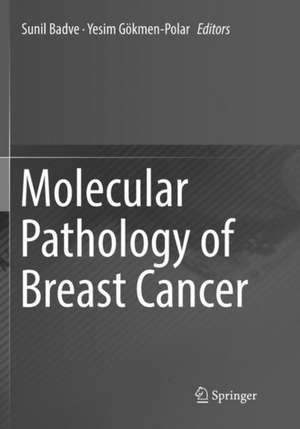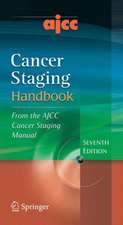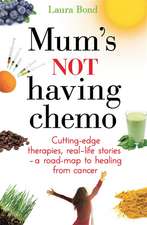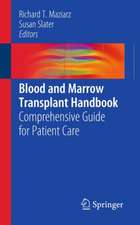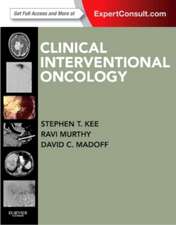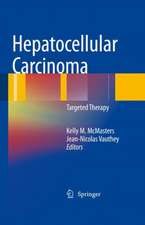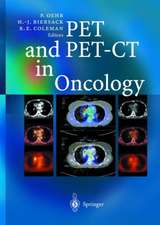Molecular Pathology of Breast Cancer
Editat de Sunil Badve, Yesim Gökmen-Polaren Limba Engleză Paperback – 3 iul 2018
The application of next generation sequencing (NGS) has provided new insights in the regulation of genomic and transcriptomic structure and function. Alterations in DNA such as mutations and single nucleotide polymorphisms (SNPs) have been correlated with outcomes and provide for novel therapeutic approaches. These NGS analyses have also revealed the extensive contributions of epigenetic mechanisms such as histone modifications, non-coding RNA and alternative splicing. All of these changes together contribute to alterations in proteome. Newer assays that allow greater stability and analytical consistency are emerging. These alterations in tumor profiles can be also now detected by imaging techniques.
The heterogeneity of both tumor and tumor microenvironment, an inevitable reality, is discussed in detail with particular focus on cancer stem cells and immune signaling. A chapter is dedicated to the emerging technology of “liquid biopsy”, which opens a novel approach for “continuous” monitoring of cancer that might be superior to conventional diagnostics,
“Molecular Pathology of Breast Cancer” provides a quick and easy, not to mention essential, tour for clinicians, pathologists and scientists who are seeking to understand the integration of molecular biology into the diagnosis, prognosis and management of breast cancer.
| Toate formatele și edițiile | Preț | Express |
|---|---|---|
| Paperback (1) | 1005.03 lei 38-44 zile | |
| Springer International Publishing – 3 iul 2018 | 1005.03 lei 38-44 zile | |
| Hardback (1) | 1038.47 lei 38-44 zile | |
| Springer International Publishing – 15 dec 2016 | 1038.47 lei 38-44 zile |
Preț: 1005.03 lei
Preț vechi: 1057.93 lei
-5% Nou
Puncte Express: 1508
Preț estimativ în valută:
192.33€ • 199.58$ • 160.76£
192.33€ • 199.58$ • 160.76£
Carte tipărită la comandă
Livrare economică 11-17 martie
Preluare comenzi: 021 569.72.76
Specificații
ISBN-13: 9783319824222
ISBN-10: 3319824228
Pagini: 428
Ilustrații: VIII, 428 p. 54 illus. in color.
Dimensiuni: 178 x 254 mm
Greutate: 0 kg
Ediția:Softcover reprint of the original 1st ed. 2016
Editura: Springer International Publishing
Colecția Springer
Locul publicării:Cham, Switzerland
ISBN-10: 3319824228
Pagini: 428
Ilustrații: VIII, 428 p. 54 illus. in color.
Dimensiuni: 178 x 254 mm
Greutate: 0 kg
Ediția:Softcover reprint of the original 1st ed. 2016
Editura: Springer International Publishing
Colecția Springer
Locul publicării:Cham, Switzerland
Cuprins
Preface
1) Translating markers in clinical practice (Lisa McShane)
2) Pre-analytical Variables, Tissue Quality and Clinical Samples from Breast Cancer Patients (David Hicks)
3) Impact of Analytical Variables in Breast Cancer Biomarkers Analysis (Anthony Watford/ Bharat Jasani)
4) Hormone Receptors in Breast Cnacer (Suijkerbuijk/van Diest).
5) Human Epidermal Growth Factor Receptor 2 (HER2) (Santa-Maria/Jain/Gradishar)
6) Triple Negative Breast Cancer (Melinda Telli)
7) Proliferation Markers in Breast Cancer (Frederique Penault-Llorca/Radosevic-Robin).
8) Novel IHC Based Biomarkers in Breast Cancer (Emad Rakha/Ian Ellis).
9) Tumor Heterogeneity in Breast Cancer (Sunil Badve)
10) Breast Cancer Stem Cells (Choi/Rosato/Chang)
11) The Tumor Microenvironmen t as a Metastasis Biomarker in Breast Cancer (Sparano/Jones/Rohan/Harney/Condeelis/Oktay) 12) Tumor Infiltrating Lymphocytes as a prognostic and predictive biomarker in breast cancer (Janakiram/Khan/Fineberg/Zang/Sparano)
13) Novel Imaging Based Biomarkers in Breast Cancer (Edmonds/Mankoff)
14) Circulating Tumor Markers for Breast Cancer Managgement (Prabhakar/Harris)
15) Circulating Tumor Cells (Banys-Paluchowski/Schneck/Krawxzyk/Fehm)
16) Circulating Nucleic acids (RNA/DNA)in Breast Cancer (Gingras/Sanarpia/Ignatiadis)
17) Prognostic Factors for Ductal Carcinoma in Situ of the Breast (Solin)
18) Prognostic and Predictive Gene Expression Signatures in Breast Cancer (Buechler)
19) Genomic Markers ER-negative Breast Cancer (Karn/Hatzis) 20) Next-Generation Seguencing Basxed Testing for Breast Cancer (Ganesan/Hirshfield)
21) Epigenetic Mechanism in Breast Cancer (Verma/Badve)
22) Nocoding RNAs in Breast Cancer (Gökmen-Polar/Badve) 23) Alternative Splicing in Breast Cancer (Gökmen-Polar)
24) Pharmagocenomics of Breast Cancer (Abramovitz)
25) Applied Proteomics in Breast Cancer (Lai/Badve)
26) Biomarkers in the Clinic (Mina/Sledge)
Index.
1) Translating markers in clinical practice (Lisa McShane)
2) Pre-analytical Variables, Tissue Quality and Clinical Samples from Breast Cancer Patients (David Hicks)
3) Impact of Analytical Variables in Breast Cancer Biomarkers Analysis (Anthony Watford/ Bharat Jasani)
4) Hormone Receptors in Breast Cnacer (Suijkerbuijk/van Diest).
5) Human Epidermal Growth Factor Receptor 2 (HER2) (Santa-Maria/Jain/Gradishar)
6) Triple Negative Breast Cancer (Melinda Telli)
7) Proliferation Markers in Breast Cancer (Frederique Penault-Llorca/Radosevic-Robin).
8) Novel IHC Based Biomarkers in Breast Cancer (Emad Rakha/Ian Ellis).
9) Tumor Heterogeneity in Breast Cancer (Sunil Badve)
10) Breast Cancer Stem Cells (Choi/Rosato/Chang)
11) The Tumor Microenvironmen t as a Metastasis Biomarker in Breast Cancer (Sparano/Jones/Rohan/Harney/Condeelis/Oktay) 12) Tumor Infiltrating Lymphocytes as a prognostic and predictive biomarker in breast cancer (Janakiram/Khan/Fineberg/Zang/Sparano)
13) Novel Imaging Based Biomarkers in Breast Cancer (Edmonds/Mankoff)
14) Circulating Tumor Markers for Breast Cancer Managgement (Prabhakar/Harris)
15) Circulating Tumor Cells (Banys-Paluchowski/Schneck/Krawxzyk/Fehm)
16) Circulating Nucleic acids (RNA/DNA)in Breast Cancer (Gingras/Sanarpia/Ignatiadis)
17) Prognostic Factors for Ductal Carcinoma in Situ of the Breast (Solin)
18) Prognostic and Predictive Gene Expression Signatures in Breast Cancer (Buechler)
19) Genomic Markers ER-negative Breast Cancer (Karn/Hatzis) 20) Next-Generation Seguencing Basxed Testing for Breast Cancer (Ganesan/Hirshfield)
21) Epigenetic Mechanism in Breast Cancer (Verma/Badve)
22) Nocoding RNAs in Breast Cancer (Gökmen-Polar/Badve) 23) Alternative Splicing in Breast Cancer (Gökmen-Polar)
24) Pharmagocenomics of Breast Cancer (Abramovitz)
25) Applied Proteomics in Breast Cancer (Lai/Badve)
26) Biomarkers in the Clinic (Mina/Sledge)
Index.
Notă biografică
Bio Data: Prof. Sunil Badve. MBBS, MD. FRCPath.
Sunil Badve is Professor in departments of Pathology and Laboratory Medicine, and Internal Medicine and the Director of Translational Genomics Core at the Indiana University Simon Cancer Center.
He received his medical degree and pathology residency at Grant Medical College and Tata Memorial Hospital for cancer. He did further training at the St George’s Medical School and at Royal Marsden Hospital, England. In USA, he trained at the Albert Einstein School of Medicine (NY) and at Yale. He served on the faculty of Northwestern University prior to joining Indiana University.
Dr. Badve’s main research and clinical expertise is in breast cancer. He is the breast Pathologist for ECOG group and serves on the Breast Cancer Steering Committee. He has been a PI and co-investigator on several NIH (R01; R21), DOD and foundation grants. He is recognized as a Komen Scholar by the Susan G Komen for the Cure. He has over publication of over 170 peer-reviewed scientific articles in addition to invited reviews and book chapters including WHO Classifications of Breast and Thymic tumors. He has several patents and has developed and commercialized a gene signature for the prognostication of thymic cancers.
He serves as the associate editor of Clinical Breast Cancer and on the editorial board of six additional journals (Modern Pathology, Analytical and Cellular Pathology, Pathology, BMC Cancer, Journal of Cancer, and Journal of Molecular Biomarkers and Diagnosis). Dr. Badve is a regular speaker at national and international pathology meetings and has conducted short courses on breast pathology for the CAP and USCAP. He has served ASCO-CAP Guidelines Committee for hormone receptor assessment in breast cancer and has been a faculty presenter at the ASCO annual meeting.
Bio Data: Assistant Prof. Yesim Gökmen-Polar, Ph.D
Dr. Yesim Gökmen-Polar is an Assistant Research Professor in the Department of Pathology and Laboratory Medicine at Indiana University School of Medicine. She received her Ph.D. in Molecular Biology at Bogazici University, Department of Molecular Biology and Genetics, Istanbul, Turkey. She further continued her training in cancer biology at the Sealy Center for Cancer Cell Biology, University of Texas Medical Branch, Galveston, Texas. She joined the Division of Hematology & Oncology at Indiana University as a research associate, and specialized in targeted therapeutics for breast cancers and thymic cancers.
She serves in several working groups such as TCGA Thymoma working group, ITMIG Tumor Bank/Biology Working group and Thymoma Tissue Bank Oversight Committee at IU School of Medicine. She also serves as a reviewer for several journals including BMC Cancer, Neoplasia, Clinical Breast Cancer, Pathology-Research and Practice, and Oncotarget. She is also a speaker for Affymetrix and a faculty presenter in meetings including USCAP and AACR.
Her research interests are centered on the identification and characterization of novel prognostic and therapeutic targets in breast cancer and thymic cancer. She has approximately 50 publications mainly in the field of cancer biology. She has patents in breast cancer prognostication and has developed and commercialized a gene signature for the prognostication of thymic cancers. Her specific expertise is in development of novel therapeutic targets (i.e. targeting EphA2 receptor tyrosine kinase, protein kinase C beta, anti-tubulins and TORC1/2) in colon, breast cancer and thymic malignancies. Her lab developed and characterized a novel human thymoma model, designated as IU-TAB-1, which was derived from a patient with the stage II thymoma (WHO type A/B). Her current research uses next generation sequencing (NGS), microarrays, and computational tools to understand the transcriptional regulation by non-coding RNAs and alternative splicing that contribute to breast cancer recurrence/metastasis. Her lab uses these approaches to develop novel therapeutics to target breast cancer and thymic cancer.
Sunil Badve is Professor in departments of Pathology and Laboratory Medicine, and Internal Medicine and the Director of Translational Genomics Core at the Indiana University Simon Cancer Center.
He received his medical degree and pathology residency at Grant Medical College and Tata Memorial Hospital for cancer. He did further training at the St George’s Medical School and at Royal Marsden Hospital, England. In USA, he trained at the Albert Einstein School of Medicine (NY) and at Yale. He served on the faculty of Northwestern University prior to joining Indiana University.
Dr. Badve’s main research and clinical expertise is in breast cancer. He is the breast Pathologist for ECOG group and serves on the Breast Cancer Steering Committee. He has been a PI and co-investigator on several NIH (R01; R21), DOD and foundation grants. He is recognized as a Komen Scholar by the Susan G Komen for the Cure. He has over publication of over 170 peer-reviewed scientific articles in addition to invited reviews and book chapters including WHO Classifications of Breast and Thymic tumors. He has several patents and has developed and commercialized a gene signature for the prognostication of thymic cancers.
He serves as the associate editor of Clinical Breast Cancer and on the editorial board of six additional journals (Modern Pathology, Analytical and Cellular Pathology, Pathology, BMC Cancer, Journal of Cancer, and Journal of Molecular Biomarkers and Diagnosis). Dr. Badve is a regular speaker at national and international pathology meetings and has conducted short courses on breast pathology for the CAP and USCAP. He has served ASCO-CAP Guidelines Committee for hormone receptor assessment in breast cancer and has been a faculty presenter at the ASCO annual meeting.
Bio Data: Assistant Prof. Yesim Gökmen-Polar, Ph.D
Dr. Yesim Gökmen-Polar is an Assistant Research Professor in the Department of Pathology and Laboratory Medicine at Indiana University School of Medicine. She received her Ph.D. in Molecular Biology at Bogazici University, Department of Molecular Biology and Genetics, Istanbul, Turkey. She further continued her training in cancer biology at the Sealy Center for Cancer Cell Biology, University of Texas Medical Branch, Galveston, Texas. She joined the Division of Hematology & Oncology at Indiana University as a research associate, and specialized in targeted therapeutics for breast cancers and thymic cancers.
She serves in several working groups such as TCGA Thymoma working group, ITMIG Tumor Bank/Biology Working group and Thymoma Tissue Bank Oversight Committee at IU School of Medicine. She also serves as a reviewer for several journals including BMC Cancer, Neoplasia, Clinical Breast Cancer, Pathology-Research and Practice, and Oncotarget. She is also a speaker for Affymetrix and a faculty presenter in meetings including USCAP and AACR.
Her research interests are centered on the identification and characterization of novel prognostic and therapeutic targets in breast cancer and thymic cancer. She has approximately 50 publications mainly in the field of cancer biology. She has patents in breast cancer prognostication and has developed and commercialized a gene signature for the prognostication of thymic cancers. Her specific expertise is in development of novel therapeutic targets (i.e. targeting EphA2 receptor tyrosine kinase, protein kinase C beta, anti-tubulins and TORC1/2) in colon, breast cancer and thymic malignancies. Her lab developed and characterized a novel human thymoma model, designated as IU-TAB-1, which was derived from a patient with the stage II thymoma (WHO type A/B). Her current research uses next generation sequencing (NGS), microarrays, and computational tools to understand the transcriptional regulation by non-coding RNAs and alternative splicing that contribute to breast cancer recurrence/metastasis. Her lab uses these approaches to develop novel therapeutics to target breast cancer and thymic cancer.
Textul de pe ultima copertă
The complex landscape of breast cancer requires distinct strategies for the management of various molecular subtypes of this disease. Rapid advances in the field of molecular biology have been bewildering for those involved in its study and management. “Molecular Pathology of Breast Cancer” aims to close this knowledge gap by discussing comprehensively the evolution, biological basis and clinical applications with a focus on the “what, when, and how” of the most significant molecular markers known to date. These markers are evaluated in the context of genomic, transcriptomic and proteomic profiles, which is integral to the practice of precision medicine.
The application of next generation sequencing (NGS) has provided new insights in the regulation of genomic and transcriptomic structure and function. Alterations in DNA such as mutations and single nucleotide polymorphisms (SNPs) have been correlated with outcomes and provide for novel therapeutic approaches. These NGS analyses have also revealed the extensive contributions of epigenetic mechanisms such as histone modifications, non-coding RNA and alternative splicing. All of these changes together contribute to alterations in proteome. Newer assays that allow greater stability and analytical consistency are emerging. These alterations in tumor profiles can be also now detected by imaging techniques. The heterogeneity of both tumor and tumor microenvironment, an inevitable reality, is discussed in detail with particular focus on cancer stem cells and immune signaling. A chapter is dedicated to the emerging technology of “liquid biopsy”, which opens a novel approach for “continuous” monitoring of cancer that might be superior to conventional diagnostics,
“Molecular Pathology of Breast Cancer” provides a quick and easy, not to mention essential, tour for clinicians, pathologists and scientists who are seeking to understand the integration of molecular biology into the diagnosis, prognosis and management of breast cancer.
The application of next generation sequencing (NGS) has provided new insights in the regulation of genomic and transcriptomic structure and function. Alterations in DNA such as mutations and single nucleotide polymorphisms (SNPs) have been correlated with outcomes and provide for novel therapeutic approaches. These NGS analyses have also revealed the extensive contributions of epigenetic mechanisms such as histone modifications, non-coding RNA and alternative splicing. All of these changes together contribute to alterations in proteome. Newer assays that allow greater stability and analytical consistency are emerging. These alterations in tumor profiles can be also now detected by imaging techniques. The heterogeneity of both tumor and tumor microenvironment, an inevitable reality, is discussed in detail with particular focus on cancer stem cells and immune signaling. A chapter is dedicated to the emerging technology of “liquid biopsy”, which opens a novel approach for “continuous” monitoring of cancer that might be superior to conventional diagnostics,
“Molecular Pathology of Breast Cancer” provides a quick and easy, not to mention essential, tour for clinicians, pathologists and scientists who are seeking to understand the integration of molecular biology into the diagnosis, prognosis and management of breast cancer.
Caracteristici
Desktop ready reckoner to one and all interested in breast cancer
An overview detailing the most recent advances in the molecular pathology of breast cancer to satisfy the requirements of a diverse group of audience
Provides rationale underlying the role of molecular markers to enable development of a holistic approach to breast cancer research and treatment
Includes supplementary material: sn.pub/extras
An overview detailing the most recent advances in the molecular pathology of breast cancer to satisfy the requirements of a diverse group of audience
Provides rationale underlying the role of molecular markers to enable development of a holistic approach to breast cancer research and treatment
Includes supplementary material: sn.pub/extras
